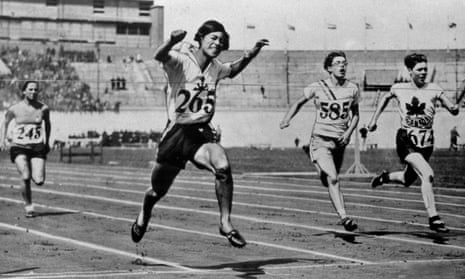Ninety years ago this summer the Times’ man at the Amsterdam Olympics sent a startling dispatch from the athletics. “The final of the 800 metres race for girls rather tended to leave the impression that such things should not be,” he wrote, barely cloaking his prejudice in concern. “The half-dozen prostrate and obviously distressed forms lying on the side of the track may not warrant a complete condemnation of the girl athletic championships but it certainly suggests unpleasant possibilities.”
Those “unpleasant possibilities” soon became depressing realities. The runners were merely tired after the race, won in a world record time. But the International Olympic Committee ruled that the 800m was far too tough for women – and promptly banned it from the Games for the next 32 years.
For years afterwards the movement towards equality remained on the slow side of glacial. It took until 1984 before women were allowed to run in an Olympic marathon; another 16 years before women’s pole vault was introduced; and – don’t laugh – the women’s steeplechase was not included in the Games until 2008. Nowadays the men’s and women’s programmes are identical in every respect but one – women compete in heptathlon, over seven events, rather than decathlon, over 10. And that, for some, is the final frontier in the battle for equality in athletics.
Next weekend that battle will become a lot spicier when the first USA Track and Field-approved women’s decathlon championship takes place in California. It is, says Becca Peter, the event’s athlete co-ordinator, a potential game changer because until now there has been little incentive for women to compete in decathlons or race directors to put them on.
“I don’t want to bash the heptathlon, which is an amazing event,” she says. “But it is less demanding than the decathlon, which is widely seen as finding the world’s best all-round athlete. What kind of message does that send to women and girls? In effect, they are being told they can’t be the world’s greatest athlete, that they can’t do as many events as men. And that isn’t right.”
It is a persuasive argument and it has the support of some on the IAAF women’s committee. Yet most heptathletes and coaches, publicly and privately, are adamant it would be a terrible idea.
Partly they believe there is no great thirst for change, given that women already have the heptathlon. But they also fear there is a higher risk of injury with the women’s decathlon because it has a different order of field events on day one and day two to avoid scheduling conflicts when men’s and women’s decathlons take place simultaneously.
That, says Toni Minichiello, the highly respected coach of the London 2012 heptathlon champion, Jessica Ennis-Hill, is a recipe for disaster. “Those events are in a certain order for a reason,” he says. “If the high jump is the ninth event rather than the fourth, as it is in the women’s decathlon, it risks greater injuries.”
Minichiello believes Ennis-Hill, one of Britain’s most popular athletes, would have left combined events if the decathlon was introduced. And he insists athletics would be better served focusing on a new era of heptathletes.
Another top coach, Les Gramantik, who trains the Olympic decathlon bronze medallist Damian Warner, is even more sceptical. “Reversing the order of the events for women is a terrible sequence considering the physical challenge of the events, where day one would be predominantly technical, followed by speed power on day two,” he warns. “Women have a great and exciting event called heptathlon, so leave it alone. I know I will not coach women for decathlon.”
Meanwhile Harry Marra, the legendary coach of the decathlon world record holder, Ashton Eaton, and the heptathlon Olympic bronze medallist Brianne Theisen-Eaton, also urge caution. “Of course women can do 10 events,” he says. “But the heptathlon is a fine test standing alone. My gut tells me to leave it be unless heptathletes and their coaches are polled and wish otherwise. Some committee of so-called experts should not be in the business of making decisions they have little knowledge of.”
Some of this antipathy comes from an understandable desire of heptathletes to hold on to what they have. There is room for only one combined event on the Olympic track and field programme. So why should they be like turkeys voting for Christmas?
The American Kendall Williams is one of the few current heptathletes to have shown an interest in the decathlon but the thought of learning technical events, such as the pole vault and discus, gives many nightmares. Perhaps, though, their worries are overstated. After all, the current women’s decathlon world record holder, the Lithuanian Austra Skuiyte, also won heptathlon silver at the 2004 Olympics and bronze at London 2012.
Peter, for her part, says she is sympathetic to any concerns and merely wishes to offer women more choice. “If there is ever going to be a switch to the women’s decathlon, you need at least eight years – or two Olympic cycles – to implement it as it is unfair to destroy the career of a current elite heptathlete,” she says.
Such a bedding-in period would take us to the 2028 Olympics – as well as marking the 100-year anniversary of the IOC’s decision to ban the 800m because it was too strenuous for women. Supporters of the women’s decathlon believe it would be an ideal riposte to that heinous act. Others, though, still need convincing.
